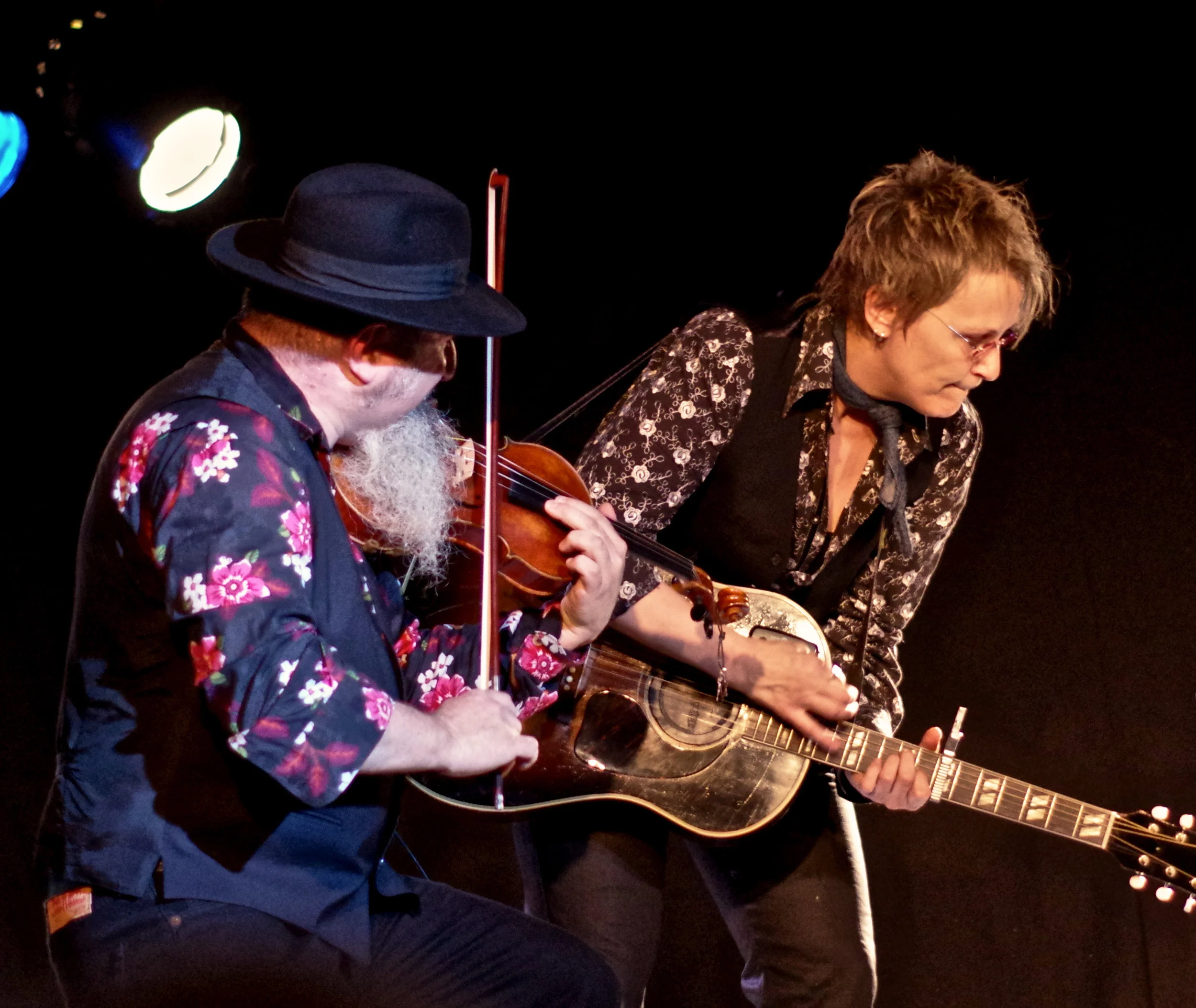Learning to Tell the Truth
Behind the Song: Your Sister Cried
(by Fred Eaglesmith) I stared out of the windshield into the rain so light I turned on my dims and somebody flashed me their brights And I reached over and turned the radio way down low Your sister cried all the way home
Lightening crashed and the road shone like a mirror A dog came out of the ditch then he disappeared I remembered a conversation we once had on the phone Your sister cried all the way home
I’ll never know how you got into such a mess
Why do the bridesmaids all have to wear the same dress? Everybody said you looked real good But I think you looked stoned Your sister cried all the way home
This song floored me this first time I heard it, with its brilliant combination of humor and sadness. The dialogue is fantastic; we don’t know who is speaking, or to whom they are talking, but it works perfectly- against all odds. This song is a true rule breaker. It has so much mystery in it!
Who is saying your sister cried all the way home? Who is the “your” in your sister? We can’t know, and it doesn’t matter because we are right there with him/her anyway. It could be anyone, a family member a, friend, insert any two people in that car talking to each other and the dialogue words works beautifully. Amazing. Insert yourself into that story, and watch the genius of the writing become become clear. This seemingly simple song is the work of a master.
Who just got married? Is the bride in trouble, or is it the groom? For that matter, are there two brides? Two grooms? No way to know from the lyrics, but the songs work brilliantly for every scenario you insert. Doesn’t seem possible to wrote a song like this, but Fred Eaglesmith has a way of pulling rabbits out of his hat. Most of us have been to a wedding where we wondered if it was a such a great idea for the couple to be tying the knot, and this song captures that queasy feeling of "I hope I'm wrong about this, but....."
This is brilliant songwriting- a fantastic song. Fred Eaglesmith is a master songwriter and story teller, and if you've not heard his songs before, I encourage you to check him out. His mastery of the craft in undeniable. He has been a mentor to me for over a decade, and I have recorded more of his songs than anyone else's other than my own.
I love this one!
Order a copy of Live at Blue Rock HERE.
Behind the Song: Blood Is Blood
This is a picture of orphaned babies in St. Vincent's from the New Orleans paper, 1962. Such a bizarre thing to call us orphans—our parents were alive and well, just not married to each other, thats all. The truth is that we were not orphans, but we were orphaned. Back then, unmarried women were shamed and often forced by their families into giving their babies away. I am the baby way in the back, the circled baby is my adoptive cousin, adopted at around the same time as me.
Blood Is Blood
(by Mary Gauthier and Crit Harmon)
Clouds are spreading like bruises on the evening sky I walk the streets alone again tonight It starts to rain still I search each passing face Blood is blood and blood don’t wash away Blood is blood and blood don’t wash away
When I was a child they told me she loved me too much She didn’t keep me ‘cause my mama loved me too much She left without a trail she left without a trace But blood is blood and blood don’t wash away Blood is blood and blood don’t wash away
I got a heart that’s ripped I got a soul that’s torn I got a hole in me like I was never born
Blood is thicker than water Blood is bound by God I don’t know who I am I don’t know who I’m not I don’t know my name I can’t find my place
Blood is blood and blood don’t wash away Blood is blood and blood don’t wash away Blood is blood and blood don’t wash away Blood is blood and blood don’t wash away I walk the streets alone again tonight
When I began writing songs I heard a whisper, way in the back of my mind, that someday I’d be called to write a record called The Foundling, and explore in a series of songs what my deepest inner world felt like. Creativity is prescient in that way, it seems to be one step ahead of me at all times, and I’m always just trying to catch up.
My life story was aching to come out of the shadows, and my subconscious was guiding me to it, to begin healing and reconciliation with truth, through my work as a songwriter.
See, I was adopted.
I feared losing my family if I asked my origins. I did not dare ask to ask where I came from. This is not an uncommon fear among adoptees. Many of us decide wait till our adoptive parents are dead to search for our original families, our original identities. The fear of losing our adoptive family, and of appearing ungrateful or disloyal keeps us from searching earlier, from asking hard questions.
But my subconscious was busy trying to help me put the pieces of my fractured past together as best it could. I needed to claim my truth to fully grow up, to be a whole, integrated person, to become truly real—and let go of the weight of not knowing, walk lighter, and be useful to others.
As hard as it is to explain, I deeply believe in this mysterious impulse for the mind to heal itself. Following it has led me down beautifully twisted roads, led me to the songs I sing, and given me this creative life I love so much.
As hard as it is to believe, the truth of own story was not available to me until I wrote the songs on The Foundling. Writing helped me make sense of things that had haunted me from the day I was born.
It took me a decade as a songwriter before I was able to tackle this project. It took me another two years of focused writing to complete the songs. It was by far the hardest work I’ve ever done as an artist—hard emotionally, physically and spiritually. I had to come face to face with some damn scary monsters. I had to make myself sit at my desk for 10 to 12 hours at a time, week after week. I had to research trauma, childhood trauma, and adoption trauma, and come face to face with my own denial of the effects of what had happened. But the inner work I was doing in therapy coincided with the work I was doing as an artist, and The Foundling songs crept up and out, cracking the floorboards of my fear, one at a time. I kept walking, and writing.
The truth of my life and the truth in my work collided.
What I learned was that my relinquishment by my birth mother on the day I was born, my year-long stay at the orphanage on Magazine Street in New Orleans, and my subsequent adoption into a family I never fully attached to were all traumatic events. And trauma needs to be dealt with.
The time was right for me to put the pieces together, as I wrote The Foundling song cycle I began to heal from the inside out—a classic case of art healing the artist. I look back on it now and wonder how I did it, or rather, how it did me. The mystery remains intact, even as I try now to explain.
The song “Blood Is Blood” is the centerpiece of The Founding cycle. It vibrates with the intensity and angst of an adoptee in full-blown identity crisis. Using John Lennon’s Mother as a guide, I let the muse walk me to the edge of my knowing till I faced the abyss, the dropping off place—the place I’d tried to avoid for 46 years.
With the muse guiding me, John Lennon’s courage encouraging me, my work in many years of therapy steering me, and my adoptee friends holding me, I found the strength to face what happened when my mother left me behind forever, on that frightful day, the day I was born.
Seeing it, knowing it, becoming aware of it, owning it—this is where all healing truly starts. And after a while, telling it moves the healing outward.
This song started with a couple of lines and a melody sent to me by my co-writer. Both the title and the repeated riff were in the clip he sent me, and I knew something great was there when I heard it. I just needed to carry it home.
I’d been reading a lot of books on adoption and trauma, and had become saturated in the work of Betty Jean Lifton, who to this day is my favorite writer on the psychology of adoption. BJ was an adoptee herself, a brilliant thinker and writer, and married to Robert J Lifton, Professor of Psychiatry at both Harvard and Yale, and the foremost expert on the psychological effects of war. He is the author of several groundbreaking books on the subject, including The Nazi Doctors.
Robert championed BJ as she did her own groundbreaking work on adoption trauma, and to this day her work on the psychology of adoption remains unsurpassed. She is an adoption reform hero, and I never could have written The Foundling without her. I got to meet her once when she came to a show I played at Joe’s Pub in NYC with the songwriter and fellow adoptee Diana Jones, who was her close friend. It was an honor to hug BJ Lifton—she was a kind, beautiful, brave and brilliant woman.
In addition to her work on adoption, she wrote many other wonderful books, including The King of Children, a biography of Janusz Korzack, the Heroic Polish Jewish Doctor who ran an orphanage during the war, and died with his orphans at the hands of the Nazis at the Treblinka extermination camp.
The song “Blood Is Blood” tells the story of the existential hole left inside of an adoptee after the loss of original family and heritage to the crucible of closed adoption. This loss is traumatic, but it is not yet generally understood. Often times, we adoptees don’t even know the loss/trauma is there because of a split in our psyche’s that shuts us out of entire rooms in our brains. Trauma is fundamental in adoption (especially closed adoptions where adoptees are given no knowledge of their heritage), but we’re just beginning to understand the ramifications of it. Certainly there is a direct link between childhood trauma and addiction as well as a variety of attachment disorders and other struggles, but we are in the infancy of understanding how this all plays out.
“Blood Is Blood” is both my story, and the story of closed adoption, an in-your-face song railing against the pain, secrets and lies of closed adoption. I’d say it’s probably the angriest and most angst-ridden song I’ve ever written.
It amazes me that in America, to this day, adoptees by the millions are denied access to our own original birth certificates. In fact, whenI was writing this song in 2014, only 6 states had opened or partially opened birth records. Think about that! Millions of adopted adults in America are denied access to our own birth certificates. They are sealed documents, locked away from us forever in the name of protecting us from…our identity?
I was told as a child that my mother loved me so much that she gave me away. I was told she “loved me too much to keep me.” A child cannot make sense of this, but even as an adult it makes my head swim. Loved me too much to keep me? I know my parents were trying to tell me that my mother could not care for me for reasons we never got in to, that she was so unselfish and generous that she gave me away so that I might be better cared for. The problem with this (aside from the fact that it’s probably not true) is that it forever equates love with abandonment, and the fear of abandonment has haunted me my entire life.
The antiquated laws that permanently seal birth certificates desperately need to be overturned, but the going is slow and the opposition is well funded. The fight for truth and justice in this arena continues. I hope this song helps, somehow. It sure helped me.
Order a copy of Live at Blue Rock HERE.
Collaboration & Chemistry
Seeing Trauma In A New Light
Rifles & Rosary Beads
Mary Nominated for GLAAD Media Award
We Are Not Alone: Lessons From 2014
Hello and Happy New Year!
In 2014, I released Trouble and Love. I hand-carried my brand new record to 125 towns, playing my new songs in theatres, cafés, coffee shops, bars and on radio shows around the world. I led 9 songwriting workshops in 3 countries, participated in 4 Songwriting with Soldiers Retreats, and played the Grand Ole Opry 4 times. One of the highlights was sharing the lineup at The Opry with 10-year-old Fiddling Carson Peters, pictured here. What a year!
Now that I have been home resting for a few weeks, lessons from my travels are beginning to crystalize. I guess most of these have been building up inside me for years, but this is the first time I’ve sat down and made a lesson list. I look at them as gifts -- as the building blocks of wisdom.
Here are my Top 10 Lessons From 2014:
- There is no such thing as an ordinary life.
- Songs are more than songs--they are the great human connectors of our time.
- Songs transcend all manner of boundaries. They speak a universal language.
- Songs heal. They are pieces of the soul reaching through eternity, to heal the heart.
- Resonance is my/our deepest desire.
- An emotionally-true song resonates to the core, to the central, innermost, or most essential part of us.
- Emotional truth is not about the facts. It is about being genuine, authentic, and vulnerable.
- At our center, we are the same. Songs are conduits for compassion and empathy, a road map into a stranger’s heart, which upon inspection - mirrors our own heart.
- A three-and-a-half minute song can temporarily bring us us to a place that does not yet exist here on earth, a place where we are safe, connected, and of one heart.
- At their best, songs breathe life into a precious idea: that we are not alone, that other people have felt and feel the way we do, and that all of humanity is made of the same mysterious, electrical, spirit infused stardust. And songs are the people’s instrument of choice- to express the wonder of it all.
Thank you for joining me on my musical journey and for being a part of this community of song. I’m looking forward to seeing you in 2015!
~ Mary Gauthier
Photo: Mary Gauthier with 10-Year Old Fiddling Carson Peters, Backstage at The Grand Ole Opry, 9/13/14Pre-Order Bettye LaVette's Worthy
Beth Neilsen-Chapman and I are so proud to have co-written the title track, "Worthy," of Bettye LaVette's new studio album, to be released January 26th! Rightly known as one of the finest R&B/blues vocalists of our time, Bettye takes "Worthy" to a whole new level with her soulful and powerful interpretation, singing from the depths of her legendary voice. Hearing Bettye sing "Worthy" has been a truly gratifying experience. If ever there were a voice exactly right for this song, it's hers. What an honor for us, as songwriters, to have this experience.
Produced by Joe Henry, the album also features tracks written by Mick Jagger & Keith Richards, Bob Dylan, John Lennon & Paul McCartney and more.
The track listing for the album is: 1. Unbelievable 2. When I Was a Young Girl 3. Bless Us All 4. Stop 5. Undamned 6. Complicated 7. Where a Life Goes 8. Just Between You Me and the Wall You're a Fool 9. Wait 10. Step Away 11. Worthy
You can pre-order the album now via the links for both formats below.
Deluxe CD-DVD edition: http://hyperurl.co/7ljeiz CD edition: http://hyperurl.co/0caxh7
"Bettye is a voice from the wilderness." - Pete Townshend
"With every song on 'Worthy," Bettye finds the thread that first will unravel it. Then she stitches it all back together until it fits her taut frame and fierce stride, until it bends to meet her; until each song's story is somehow, miraculously, telling her own." - Joe Henry
Rolling Stone Lists Trouble & Love In Top Albums
"These nine songs are well-crafted signposts along the path of a hard break-up. Trouble & Love winds from the stark goodbye of "When a Woman Goes Cold," to struggles with self-esteem in "Worthy" and finally suffering though the hard reality of "How You Learn to Live Alone." When Gauthier concludes "I'm moving on/Through the pain," the weathered reserve of her voice promises no happy endings. This is a songwriter who knows her titular subjects go together like a horse and carriage, and that the trouble doesn't subside when the love dies." Thank you, Rolling Stone, for including Trouble & Love in the Best 40 Country Albums of 2014!
Trouble & Love Available NOW!
We are pleased to announce that Trouble and Love is available on Vinyl NOW. Check it out at the store, HERE. Thank you!
Why Do Songs Matter?
Most of life’s joy comes from love and connection, and most pain comes from love lost. In this, all of us are alike, and songs are a universal language that connects our hearts. Songs do matter, they’re important, and there’s nothing else nothing quite like them. They are our mother tongue. I was recently asked to write about why songs matter. I immediately think of Woody Guthrie’s guitar, with the saying, “This Machine Kills Fascists” hand-written on it. Woody believed singing truth to power is ultimately more persuasive than violence.
I also think about the soldiers I work with in the songwriting workshops, how writing a song about their war experience lifts a heavy weight off of their hearts. At the deepest level, songs can change lives. They help us heal. We can grab a song and say YES! LOOK! This is how I feel. Songs are human emotion dressed in melody and story. Songs express our hopes and dreams, our concerns, our playfulness, and they help us voice our values, anger, and frustrations.
Songs sing our truths, highlight our shared experiences, and help articulate the full range of human feelings. Songs can give us the hope we need, and the faith we are lacking when we are struggling. Songs see us, and we see ourselves in them. They don’t require an education to understand, they transcend language, race, age, sexual preference, nationality and religion, and they are timeless. When we feel a song deeply, we claim it as our own and can play it hundreds of times.
Songs can also be conduits for compassion and empathy, a road map into a stranger’s heart, which upon inspection - mirrors our own heart. Songs help us know each other and they also can plug us into the spiritual and sacred realm of faith, hope, compassion, mercy, charity, forgiveness and humility. Through the alchemy of song, even sad songs create the feeling of connection because we are reassured that we are not alone. Songs are what feelings sound like.
Why do songs matter to you?
"Without music, life would be a mistake." - Friedrich Nietzsche
Standing Ovations & Cold Sweat
Somewhere along the way of my seven-week, five-country, 33-show tour of Europe, I started taking a picture of the audience after my bow, before I leave the stage, during the ovation. Ovations used to terrify me. When they first started happening in my career, fear crawled up my spine like electricity, cold sweat formed on my skin, and the need to run overtook me. I’d bow quickly, mumble a panicked, “Thanks y’all” and exit the stage as fast as I could.
Believe it or not, it was not easy to let in the applause. It frightened me, I wanted to shoo it away. It felt narcissistic, like too much ME, so self-indulgent it was embarrassing. I felt unworthy of it, I felt like a fraud, a fake.
I worked diligently to write songs that emotionally connected, but when they did their job, it unhinged me.
The third wall (that space separating the audience from the performance, traditionally an imaginary wall completing the enclosure of the stage) comes down in an ovation, and for that joyful moment, we are united, songwriter, musicians, listeners, as one.
An artist’s work is to be a conduit for human connection, and at the end of most nights’ work I can feel this oneness, alive in the room, in our hearts. Songs are bigger than songs; music is more than music.
Our lives all contain experiences we struggle to understand and come to terms with: tender wounds, concealed scars, unresolved longings, jagged fault lines. Songs speak in the mother tongue, the language of the human heart.
We are attracted to stories and songs because they help explain the mystery of why we exist and how we turned out the way we have. A great song is a friend, a travelling companion we take with us when we go.
We want to thank the songwriter for this gift, so we stand, and say Bravo! It’s giving back - a reciprocity.
However, I was not prepared for the audiences’ emotions, or my own. It took years to figure out how to accept the loving energy of an ovation with grace, and return it graciously. It eventually occurred to me that it’s not ME that I stand there for - it’s WE, US, all of us mortal, all of us vulnerable. Somewhere along the way it occurred to me that letting love in is in itself an act of love.
Looking at the ovation pictures later, back at the hotel room, it makes me happy to see the smiling faces of the people standing up, sending love, joy-- beautiful LIFE energy. I can look it in the eyes now, and allow it in, send it back out, and embrace the moment without fear.
To reach for the stars, and not for the hand next to mine, is to miss the point of being an artist.
Thank you all for letting me, the kid who did not know how to be loved, grow up in front of you. It's an amazing journey.
No Depression Interviews Mary Gauthier
 I was honored to be interviewed by No Depression's Kim Ruehl this month!
Read "Songwriters on Songwriting" HERE.
I was honored to be interviewed by No Depression's Kim Ruehl this month!
Read "Songwriters on Songwriting" HERE.
The Power of Truth
Monday night I played a beautiful listening room called Morris Hall in the medieval town of Shrewsbury, England, the town that Charles Darwin was born in. I’m at the beginning of a seven-week tour of the UK and Europe, where I’ll be enjoying the stages of fine theatres in five different countries. It’s hard to believe that I’m the same person who used to be terrified of the stage, mortified…petrified…. The first time I played music on stage in front of an audience, a cold, clammy sweat formed on my forehead and upper lip, then spread down to my hands and fingers. My legs started shaking, and the trembling spread to my arms and the rest of my body. My saliva evaporated, and the inside of my mouth and throat became so dry I could have spit dust. My heart raced like galloping horses, pounding was all I could hear, and I came close to having a panic attack and bolting.
I was 35 years old and beginning to pursue a dream I’d had since I was a teenager, but it was a dream I’d never spoken out loud. I’d held it inside so deep that I forgot it was there, entombed and silent, covered by years of feeling of unworthy. I ignored it, buried it, and set off to do other things. It was a secret dream so dear to me that I dared not speak it—it would break my heart if it didn’t come true, so not acknowledging it was a way of trying to protect myself from disappointment. My secret? I wanted to be a songwriter.
I got sober at 28 years old, and my long buried truth started rising to the surface, asking to be reconsidered.
I carried my tangled, repressed dream onto the stage with me that first night, and it was too heavy to maneuver delicately. I buckled under the weight of it. I forgot the words, chords, and melody. I fought the impulse to run and survived my less than impressive debut, and became determined to get on stage again and do it better, but the terrors followed me, and stage fright choked me every time I got on stage. I was determined to find a way to overcome it, but over and over, I’d take the stage, plug in my guitar, and completely freak out.
 It was a cold New England February night when I encountered a lesson in songwriting that helped me begin the process of breaking free from the stage fright horrors I suffered. I’d been playing songs at open mics for a year or so at this point, working hard to develop thicker skin--practicing the song I was going to play, over and over and over again. But once I left my living room for the stage, the terror always returned.
It was a cold New England February night when I encountered a lesson in songwriting that helped me begin the process of breaking free from the stage fright horrors I suffered. I’d been playing songs at open mics for a year or so at this point, working hard to develop thicker skin--practicing the song I was going to play, over and over and over again. But once I left my living room for the stage, the terror always returned.
On this particular night, I was one of almost 100 people signed up to play the open mic at a venue outside of Boston called the Old Vienna Coffeehouse. Each songwriter was allowed to play one song. I drew a late number, real late. About two hours in, still waiting for my turn to play, a farmer type fellow took the stage with his guitar. He was much older than most of us, and quite heavy, in overalls and a ragged red checkered shirt buttoned up to his neck, a dilapidated straw hat with a hole in it, and dirty work boots. He was so big that it made his guitar look tiny.
No one cared when he started to play - we were waiting to play our own songs and get out of there. People tried not to groan as he stood on stage with his eyes closed, banged his guitar into the instrument mic during the first verse of his song, and sang in a shaky voice. The audience started talking loudly, ignoring him. But when he got to the words of his chorus, the entire room went silent. His words sliced through our indifference like a razor blade, we forgot our boredom, our impatience, ourselves. His honesty made us drop our judgment of his appearance and his limited musical ability. His song sucked all that scattered energy out of the room, focused us, and sang us to a sacred place. The Truth. He was singing about the loss of his wife, about how he felt now that she was gone.
“I’m gonna walk in the water 'til my hat floats away.”
All eyes were on him. Many were filled with tears. We believed him. He was telling us his truth in the way that made us feel our own. Our hearts opened, our eyes opened. And I learned…yes, finally, I got it, THIS is what my job is. Honest songs tell us what it means to be human, and it doesn’t matter who sings them, they are beautiful. From then on, to this very day, that’s what I try to do when I get on stage. Quit sweating the small stuff. Tell the truth, don’t worry about what people think about me, just be honest, and it’ll all work out.
Mercy Now Makes Rolling Stone List
 I am THRILLED that "Mercy Now" was included on Rolling Stone's list of the 40 Saddest Country Songs Of All Time. I am truly honored. Thank you, Rolling Stone!
I am THRILLED that "Mercy Now" was included on Rolling Stone's list of the 40 Saddest Country Songs Of All Time. I am truly honored. Thank you, Rolling Stone!
You can grab Mercy Now HERE.
Hello from Kansas
Kansas. A state I was once thrown out of! When I was a seventeen-year old kid, I was living in a halfway house in Salina. I got a job driving cars through the carwash in the dead of winter, spraying off ice and salt from the cars, washing them down with a pressure washer, then driving them through the mechanical car wash. I had sticky fingers then, and I grabbed change, 8-track tapes, and in one case, a bottle of pills from a Catholic priest's long, white sedan.
I was arrested for my criminal ways the day before my 18th birthday, and put in the Salina County Jail. I spent my birthday in solitary, my only visitor a sweet little church lady, who came to pray and sing with me. I’ll never forget her kindness. I was so glad to see her it made me cry. Eventually, the police told me that if I left Salina and never came back, they’d let me out and they would drop the charges. That was 35 years ago, and this is my first time back to Salina. I will be performing a benefit for Central Kansas Foundation, “a provider of quality, effective, and innovative substance use disorder prevention and treatment since 1967.” Full circle, right? Glad to make my return for a good cause!
Also in my news, I’ve been playing at The Grand Ole Opry quite a bit lately, and having a great time asking folks to join me on stage. Here’s a video of Another Train at The Opry, with Kathy Mattea, Marty Stuart, and Radney Foster. And, I'll be back at The Opry again on September 13. C'mon by.
 I’ll be on the road in the mid-west from September 14-20, sharing the stage with my dear friend Sam Baker. Our tour dates are all on my Tour Page. And for a little taste, you can order the Limited Edition Mary & Sam 7" vinyl with download included! Order it RIGHT HERE. And there are plenty of Europe dates coming up, as I head to the UK, Netherlands, Norway and Italy. Hope to see you out there! Check out my Tour Schedule, I could be headed your way.
I’ll be on the road in the mid-west from September 14-20, sharing the stage with my dear friend Sam Baker. Our tour dates are all on my Tour Page. And for a little taste, you can order the Limited Edition Mary & Sam 7" vinyl with download included! Order it RIGHT HERE. And there are plenty of Europe dates coming up, as I head to the UK, Netherlands, Norway and Italy. Hope to see you out there! Check out my Tour Schedule, I could be headed your way.
Songwriting with Soldiers
I’ve been teaching a lot this year, as well as Songwriting Songs With Soldiers, writing songs with vets returning home from Iraq and Afghanistan. When my friend, SWS founder Darden Smith, asked me to join him, I wondered what would happen if you put 15 soldiers and 4 professional songwriters in a retreat center for 2 1/2 days, and asked them to write songs together, with the sole purpose of getting the veterans to open up and talk about their time in the service, so the songwriters could turn their soldiers stories into songs. Well, I am now a songwriter who has had the great honor of writing with soldiers in that scenario, and what I learned in the process of working with the vets, has helped me to understand what songs are truly for, what songs have the power to do in the world. Working with the soldiers has helped me to understand my job as a songwriter on a much deeper level than any work I’d done in the music business prior.
Here’s what I learned.
Songs build bridges over broken human connections.
They help bring us back in when we are removed, show us that we are not alone. They reassure us that our deepest fears --that no one has ever felt the way I do before, that no one could understand what I am going through, that I am totally and utterly alone -- are not true. We humans are so very much alike on the inside, and songs announce to the world our universal human condition, through their lyrical and melodic expressions of how we feel. They are timeless, weightless, and can’t be seen, but they are the great human connectors, and when you recognize yourself in a song, you know you are not alone.
Songs are what feelings sound like.
I’ve come to see songwriting as the process of a soul trying to heal a heart. It’s that simple, and that mysterious. Songs come from a spiritual place, a place outside of our conscious understanding. They come up from our subconscious, from another world, a beautiful world that artists reach for and point to in all the arts.
Songwriters often speak of songs coming through them, not from them. The great songwriter Harlan Howard (I Fall To Pieces, Busted) used to say, “I don’t write them, I just write them down.” We songwriters are the lightening rods, not the lightening. Sure, we must work hard, and let me tell you, it’s a real job, but in the end, we are students working inside the schoolhouse of a mighty mystery. And what we are doing, our highest contribution, is to help ourselves, and others, heal.
Songwriting is empathy, for self and for others.
Songs are a soul expressing itself. Songs are like white blood cells, coagulants for the heart/soul. They come rushing in when there is a wound. Songs often come to a songwriter to help heal emotional blows so low that their frequencies reverberate in a body and soul for a lifetime.
At their best, Songs are not products for a market place. They are spiritual medicine for a world gone wrong. Humans can get out of sync with each other, out of rhythm. Trauma does this to us in an instant, removes us from our life, and it removes us from each other. Songs can help us return.
Songs make beauty out of the beast.
The soldiers came to the retreat wounded, inside. Removed. Traumatized. I doubt you can live through combat without being traumatized. War is traumatic. Songs are a way past a menacing babble of closed frontiers, into the possibility of mutual comprehension. Deep resonance with each other is possible, when we sing together, and our hearts are one in song. Songs help re-set the balance, in the direction of connection, truth, and freedom.
But by their nature, soldiers don’t like to talk about what they have been through. Silence is a soldier’s code of honor. Soldiers never speak of their world, those who have seen combat do not talk about it. Those who talk about it have not seen combat. The soldiers knew what they signed up for, and coming out the other side of it alive is enough. They don’t want to discuss what they’ve seen, what they’ve done. No need to share the details with civilians. Soldiers don’t want to tell their stories to people who have not been there. Soldiers talk to soldiers, if they talk at all.
So asking a soldier to talk to songwriters is a stretch, but that’s what we were up to at that retreat center, and the goal was to get a song written for every solider there. After the initial hellos and small talk, we got down to business. The first soldiers I spoke to seemed very close, two women vets, who sat close, whispered thoughts into each others ears, held each others arms, gave off the body language of two people who were very committed to their friendship, who had been through a lot together. I asked them if they were battle buddies, and the answer I got became my first song I wrote with soldiers.
“We have each other’s 6.”
“What? What’s that?” I asked.
“You know,” the soldier said, without emotion.
“I got her back. She’s got mine. On the battlefield, 6 o’clock is always behind you, 12 o’clock in front. To have someone’s 6 is to have their back.”
And in wartime, to have someone’s 6 means you’d die for them. When the weight of that hit me, I knew I was entering another world now, a world I knew nothing about. I got my first glimpse into Soldier’s world, a world where people die for each other. This is what soldiers do, it is their duty, commonplace, not astonishing. In order to survive, soldiers must be willing to die for one another. And part of their deep bond is the survivor’s guilt, the aching memories of those they’ve lost, they carry that weight everywhere they go.
Through the healing mystery of song, we were able to tap into their stories, the ones we were told, and the ones we were not told. We managed to get a song written for every soldier, all 15 of them. As we played them their songs, the soldiers faces opened up, their eyes lit up, their hearts opened up. They sang with us, we cried together, we laughed together, we saw each other’s hearts. We connected. And in this connection, with the songs recorded for them to take with them and keep forever, I think we were able, through song, to bring a few soldiers a little closer to home.
[audio m4a="http://www.marygauthier.com/MG2012/wp-content/uploads/2014/08/I-Got-Your-6.m4a"][/audio]
I Got Your 6 by Mary Gauthier, Meghan Counihan, Britney Pfad
6 clock’s always behind you 6 o’clock on the battlefield 6 o’clock is black as gun smoke At 6 o’clock our deal is sealed
No need to talk or testify Just keep your story tucked inside No a savior on a crucifix Look in my eyes I got your 6
6 o’clock the world falls silent 6 o’clock the guilt remains 6 o’clock the breath goes sour At 6 o’clock I’ll hold your pain
No need to talk or testify Just keep your story tucked inside No a savior on a crucifix Look in my eyes I got your 6 At 6 o’clock I will defend you At 6 o’clock just call my name At 6 o’clock I’d die for you And I know you’d do the same
6 o’clock’s always behind you 6 o’clock on a battlefield 6 o’clock is black as gun smoke At 6 o’clock our deal is sealed
@2014 All rights reserved.
I Got your 6
can also be heard
on SoundCloud![]()
Mary Gauthier on Fresh Air, with Terry Gross
I was in the studio with Terry Gross a few weeks ago, and got to experience first hand her charisma, razor sharp intelligence, and generosity of spirit. She is an American treasure, one of the best interviewers on the air today, and a media giant. It was my great pleasure to sit with her and talk for an hour. Here is a link to the interview. Click on the image below, and it will bring you there, to the Fresh Air broadcast.






















